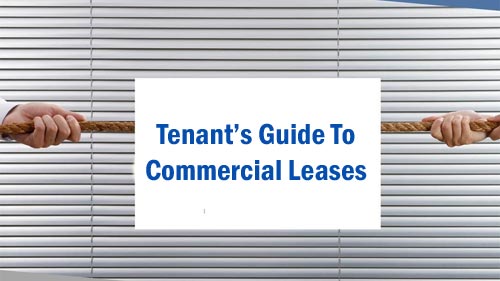 A place to conduct the business is a basic necessity when you set out to start your dream business. If this place is your own home there are no major concerns with regard to the real estate except that you may need a license for the business and maybe some kind of permission from your local council. But, the game changes significantly when you plan to lease out commercial space. The first step in such a case is finding a competent commercial lease dispute lawyer or commercial lawyer well versed with commercial property law. The Australian government has created well-defined regulations and rules on the construction of commercial leases. But, interpreting legal language and terminology is often beyond most business people and that is another reason why a commercial lawyer or commercial lease dispute lawyer should be engaged in creating the commercial lease document.
A place to conduct the business is a basic necessity when you set out to start your dream business. If this place is your own home there are no major concerns with regard to the real estate except that you may need a license for the business and maybe some kind of permission from your local council. But, the game changes significantly when you plan to lease out commercial space. The first step in such a case is finding a competent commercial lease dispute lawyer or commercial lawyer well versed with commercial property law. The Australian government has created well-defined regulations and rules on the construction of commercial leases. But, interpreting legal language and terminology is often beyond most business people and that is another reason why a commercial lawyer or commercial lease dispute lawyer should be engaged in creating the commercial lease document.
Binding contract
Like any other contract, a commercial lease is a legally binding contract bestowing certain rights to the tenant over a defined time frame. The lessee or the tenant should understand every bit of what is written in the contract document before affixing his signature and accepting the conditions outlined in the contract. Importantly, the lessee should also understand that if an unfortunate dispute arises, his interests cannot be protected under the cover of ignorance. But such situations can be avoided by hiring a competent commercial lawyer or commercial lease dispute lawyer. Legal professionals can comprehend the lease document thoroughly and cull out clauses or conditions that can potentially snowball into a problem for the lessee on a future date.
Due diligence
Signing up a commercial lease should be done with great care and due diligence. Due diligence is an important component of every contract and more so with a commercial lease. Some landlords can present multiple reasons to hurry through the process of a commercial lease and pressure may also be exerted by your estate agent and these reasons can include other clients waiting to grab the same premises, the landlord is going on a foreign tour, and so forth. But, it is difficult to veracity these claims and once you sign on the dotted lines, potentially you may get trapped. Therefore your focus should always be on what works in your best interests. A commercial lawyer who has deep knowledge of commercial property lawyers can assist you and ensure that you are not coerced into signing a commercial lease document prepared by the landlord or his agents.
Legal experts can walk you through the entire process
When you plan a commercial lease, ideally you should get help from legal experts like a commercial lawyer or a commercial lease dispute lawyer. Most business people cannot comprehend the legal language or understand the implication of various provisions. But, the legal professionals can dig deep into various clauses and suggest amendments when needed or even suggest the addition of new clauses to keep your interests as a lessee fully protected. You should also consult your accountant and/or financial advisor to gain a better-understanding cash flow to give you a comprehensive idea of the expenditure on account of the lease across the lease tenure. Similarly, you should also speak to your insurers to understand the best possible insurance cover for the leased premises.
Local council
Significant powers are vested with your local councils with regard to the setting up of businesses within a defined area. Therefore, while scouting for premises for your business, you should consider multiple options so that if any of your options get hit by a local council regulation, you have another option to work with. Similarly, if you are setting up a retail business, you may also want to consider the amount of regular footfall that you can expect in the chosen premises and also how the footfall can grow over a period of time. Easy accessibility to the chosen premises, parking facilities as well as parking regulations would also weigh in for retail businesses.
Understand the difference in types of leases
While creating a lease deed, you should also know that there are different types of leases and your growth needs should be factored in while choosing the type of lease. Therefore, you should consider if you should opt for a short term lease or a long term lease. Perhaps you may have plans to move to a bigger and different location in the foreseeable future when a short term lease would be ideal. But, when the premises you have considered is ideal for a longer stint, you should negotiate a long term lease with the lessor.
Shopping malls
If you are leasing space in a shopping mall, you should exercise great care. Generally, malls charge higher rent compared to similar space elsewhere and can with many restrictions too with regard to the business type and you may not be permitted to conduct certain businesses. Other considerations will include closing and opening hours, handling of troublesome customers, common security arrangement, using common space, etc. A commercial lawyer can help you understand these constraints better.
Consider these factors too
Would the lease duration be adequate for setting up the business and earning reasonable profit from it across the lease tenure? If there is fluctuation in the reasonable market value of lease rent, is there a clause in the lease agreement providing for a retail valuer to reassess the rent? Who is responsible for the payment of legal expenses for the creation of the lease document and at what intervals are you required to pay the rent? If rent is paid every month, is it at the start of the month or the end of the month and does belated payment attract any penalty?
What options are built into the lease agreement?
Is there a short closure or exit option available to you? At some point across the lease tenure if you choose to own the leased premises, is there a provision to negotiate that. What are the lease renewal terms and terms governing sub-letting? Who is responsible for additional expenses like refitting, repairs, cleaning, electrical energy charges, and maintenance, etc.
Conclusion
In a legally enforceable contract, nothing can be left to chance and the minutest detail should be incorporated into the document to avoid potential conflicts on a future date.




